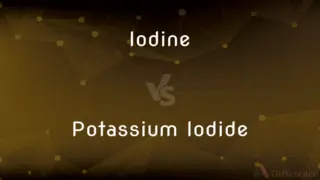Cotton vs. Cotton Blend — What's the Difference?
By Tayyaba Rehman — Published on November 30, 2023
Cotton is a natural fiber obtained from the cotton plant. Cotton Blend refers to a fabric combining cotton and one or more different fibers.

Difference Between Cotton and Cotton Blend
Table of Contents
ADVERTISEMENT
Key Differences
Cotton and Cotton Blend represent different types of fabrics. Cotton is a pure, natural fiber harvested from the seed pods of the cotton plant. Cotton Blend, on the other hand, is a mixture, where cotton is combined with another type of fiber, such as polyester or spandex.
Cotton is renowned for its softness, breathability, and natural feel against the skin. It's often used in clothing items like shirts, dresses, and underwear due to its comfort. Cotton Blend fabrics leverage the strengths of cotton but enhance it by blending with other materials, which can introduce qualities like wrinkle resistance or elasticity.
In terms of durability and maintenance, Cotton might be more prone to wrinkles and shrinkage compared to some blends. Cotton Blends, by incorporating other fibers, can be designed to be more resilient, stretchy, or maintain color better.
Cotton tends to be biodegradable because it's a natural fiber. It is a primary choice for those looking for eco-friendly clothing options. Cotton Blends, depending on the fibers they're combined with, might not decompose as readily, especially if synthetic materials are included.
Cotton is a versatile fabric but might not be optimal for all clothing needs. With Cotton Blends, manufacturers can target specific characteristics, whether it's moisture-wicking for athletic wear or adding a glossy finish for a more luxurious look.
ADVERTISEMENT
Comparison Chart
Composition
100% natural fiber from cotton plant.
Mix of cotton and one or more different fibers.
Characteristics
Soft, breathable, biodegradable.
Combines properties of cotton and other fibers.
Care
Might wrinkle or shrink more easily.
Often more resistant to wrinkles or shrinkage.
Use Cases
Everyday clothing, eco-friendly products.
Athletic wear, wrinkle-resistant shirts, stretchy garments.
Durability
Natural wear over time.
Potentially enhanced durability due to added fibers.
Compare with Definitions
Cotton
A natural material used predominantly in textiles.
Cotton fabrics have been used for centuries in various cultures.
Cotton Blend
A mixture enhancing cotton's properties with other materials.
Cotton blend socks with spandex offer a snug fit.
Cotton
A breathable and soft fabric ideal for skin comfort.
Many prefer cotton bed sheets due to their softness.
Cotton Blend
A fabric composed of cotton and another type of fiber.
The cotton blend shirt retained its shape even after multiple washes.
Cotton
Any of various shrubby plants of the genus Gossypium, having showy flowers and grown for the soft white downy fibers surrounding oil-rich seeds.
Cotton Blend
A compromise between pure natural and added synthetic properties.
Cotton blend jeans often have a slight stretch for better fit.
Cotton
The fiber of any of these plants, used in making textiles and other products.
Cotton Blend
A versatile fabric offering combined benefits.
Cotton blend curtains can be both soft and sunlight-resistant.
Cotton
Thread or cloth manufactured from the fiber of these plants.
Cotton Blend
Textile integrating the comfort of cotton and features of other fibers.
Cotton blend activewear wicks moisture better than pure cotton.
Cotton
Any of various soft downy substances produced by other plants, as on the seeds of a cottonwood.
Cotton
To take a liking; attempt to be friendly
A dog that didn't cotton to strangers.
An administration that will cotton up to the most repressive of regimes.
Cotton
To come to understand. Often used with to or onto
"The German bosses ... never cottoned to such changes" (N.R. Kleinfield).
Cotton
Gossypium, a genus of plant used as a source of cotton fiber.
Cotton
Any plant that encases its seed in a thin fiber that is harvested and used as a fabric or cloth.
Cotton
Any fiber similar in appearance and use to Gossypium fiber.
Cotton
(textiles) The textile made from the fiber harvested from a cotton plant, especially Gossypium.
Cotton
(countable) An item of clothing made from cotton.
Cotton
Made of cotton.
Cotton
(transitive) To provide with cotton.
Cotton
To supply with a cotton wick.
Cotton
To fill with a wad of cotton.
Cotton
(horticulture) To wrap with a protective layer of cotton fabric.
Cotton
To cover walls with fabric.
Cotton
(tar and cotton) To cover with cotton bolls over a layer of tar (analogous to tar and feather )
Cotton
To make or become cotton-like
Cotton
To raise a nap, providing with a soft, cottony texture.
Cotton
To develop a porous, cottony texture.
Cotton
To give the appearance of being dotted with cotton balls.
Cotton
To enshroud with a layer of whiteness.
Cotton
To protect from harsh stimuli, coddle, or muffle.
Cotton
To rub or burnish with cotton.
Cotton
To get on with someone or something; to have a good relationship with someone.
Cotton
A soft, downy substance, resembling fine wool, consisting of the unicellular twisted hairs which grow on the seeds of the cotton plant. Long-staple cotton has a fiber sometimes almost two inches long; short-staple, from two thirds of an inch to an inch and a half.
Cotton
The cotton plant. See Cotten plant, below.
Cotton
Cloth made of cotton.
Cotton
To rise with a regular nap, as cloth does.
It cottons well; it can not choose but bearA pretty nap.
Cotton
To go on prosperously; to succeed.
New, Hephestion, does not this matter cotton as I would?
Cotton
To unite; to agree; to make friends; - usually followed by with.
A quarrel will end in one of you being turned off, in which case it will not be easy to cotton with another.
Didst see, Frank, how the old goldsmith cottoned in with his beggarly companion?
Cotton
To take a liking to; to stick to one as cotton; - used with to.
Cotton
Silky fibers from cotton plants in their raw state
Cotton
Fabric woven from cotton fibers
Cotton
Erect bushy mallow plant or small tree bearing bolls containing seeds with many long hairy fibers
Cotton
Thread made of cotton fibers
Cotton
Take a liking to;
Cotton to something
Cotton
A soft, fluffy staple fiber from the cotton plant.
Pure cotton shirts are ideal for hot summer days.
Cotton
A plant cultivated for its fiber and seeds.
Cotton farming plays a significant role in many countries' economies.
Cotton
A biodegradable fiber with versatile uses.
Cotton tote bags are an eco-friendly alternative to plastic.
Common Curiosities
What is cotton made from?
Cotton is made from the natural fibers of the cotton plant.
Are cotton blends always part synthetic?
No, they can blend cotton with other natural fibers, but often include synthetics for specific properties.
Which is softer, cotton or cotton blend?
Pure cotton is generally softer, but blends can be designed for softness too.
How do I care for cotton clothing?
It's often advised to use cold water and gentle cycles to maintain cotton's longevity.
Is cotton hypoallergenic?
Generally, cotton is hypoallergenic and gentler on the skin than many synthetics.
Why might someone choose a cotton blend over pure cotton?
Cotton blends can offer added durability, stretch, or wrinkle resistance.
Do cotton blends shrink less than pure cotton?
Often, cotton blends are less prone to shrinking compared to 100% cotton.
Is cotton biodegradable?
Yes, cotton is a natural fiber and is biodegradable.
Why are cotton blends used in activewear?
Cotton blends can offer moisture-wicking or elasticity, ideal for athletic wear.
Share Your Discovery

Previous Comparison
Iodine vs. Potassium Iodide
Next Comparison
Dermatologist vs. Skin SpecialistAuthor Spotlight
Written by
Tayyaba RehmanTayyaba Rehman is a distinguished writer, currently serving as a primary contributor to askdifference.com. As a researcher in semantics and etymology, Tayyaba's passion for the complexity of languages and their distinctions has found a perfect home on the platform. Tayyaba delves into the intricacies of language, distinguishing between commonly confused words and phrases, thereby providing clarity for readers worldwide.













































